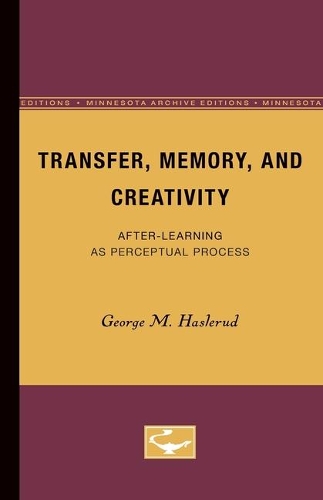
Transfer, Memory, and Creativity: After-Learning as Perceptual Process
(Paperback)
Publishing Details
Transfer, Memory, and Creativity: After-Learning as Perceptual Process
By (Author) George Haslerud
University of Minnesota Press
University of Minnesota Press
2nd January 1973
United States
Classifications
Professional and Scholarly
Non Fiction
Physical Properties
Paperback
192
Width 140mm, Height 216mm
Description
Transfer, Memory, and Creativity was first published in 1972.Dr. Haslerud, a psychologist, presents a valuable new theory of the transfer of learning, a theory which provides new insights into a neglected aspect of the psychology of learning. The findings and conclusions of his work have important implications for the problems of education, especially in view of todays urgent need to improve the results of schooling.Through his concept of after-learning (the learning which takes place after the period of formal learning has ended) as a perceptual process, the author has succeeded in identifying factors or conditions which have tended to limit transfer of learning to boundaries of the literal and to prevent a progression to creative achievement. Dr. Haslerud contends that previous theories of the transfer of learning have been either irrelevant or insusceptible to specific application. With the new theory and its deductions, he points out, all learning can become relevant.Using several new constructs in his theory, Dr. Haslerud spells out the assumptions and definitions of terms which are changed by the perceptual view, supporting them in part by experimental evidence and suggesting ways in which hypotheses which are still provisional may be tested.The book is important for concerned citizens and school and college administrators who are seeking better educational outcomes as well as for educational and other psychologists who research and teaching involves learning theory.
Author Bio
George M. Haslerud was a professor emeritus of psychology at the University of New Hampshire. He also taught, as a Fulbright professor, at the University of Kyoto, Japan, and at the Universidad Catolica, Lima, Peru.
